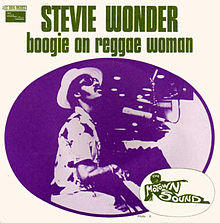| "Boogie On Reggae Woman" | ||||
|---|---|---|---|---|
 | ||||
| Single by Stevie Wonder | ||||
| from the album Fulfillingness' First Finale | ||||
| B-side | "Seems So Long" | |||
| Released | November 1974 | |||
| Genre | Funk | |||
| Length | 4:55 (Album version) 4:05 (1974 single[1]) 5:14 (1999 version) | |||
| Label | Tamla | |||
| Songwriter(s) | Stevie Wonder | |||
| Stevie Wonder singles chronology | ||||
| ||||
"Boogie On Reggae Woman" is a 1974 funk single by American Motown artist Stevie Wonder, from his album Fulfillingness' First Finale. Despite the song's title, its style is firmly funk/R&B and neither boogie nor reggae. It continued Wonder's successful Top Ten streak on the pop charts, reaching number three and also spent two weeks at number one on the soul charts.[2] Billboard ranked it as the No. 25 song for 1975.
It features Wonder's distinctive harmonica, although not his usual chromatic type, but instead a diatonic A-flat "blues harp".[3] The song is also notable for Wonder's pulsating Moog synthesizer bassline. The lyrics are designed as a dialogue between "nice" and "naughty" intent, including the introduction to his harmonica break, which incorporates Wonder's casual but repeated question "Can I play?"
Following conclusion of the vocal, the harmonica is reprised for the remaining seventy seconds, and concluding thirty bars of the tune, to the fade.
Writing for AllMusic, Ed Hogan said, "'Boogie on Reggae Woman' was light and bouncy, strutting along on a funky, percolating pulse. Johnny Nash's 1972 number one pop gold single 'I Can See Clearly Now' had primed the mainstream audience for the reggae sound that Wonder employed on the cut."[4] Billboard said the song has an "irresistible beat," "infectious melody" and "Caribbean flavor."[5]
Personnel
- Stevie Wonder – lead vocal, Fender Rhodes, piano, harmonica, drums, Moog bass
- Rocky Dzidzornu – congas[6]
See also
- List of number-one R&B singles of 1974 (U.S.)
References
- ^ "Stevie Wonder - Boogie On Reggae Woman (Vinyl)". Discogs.com. Retrieved 2016-10-09.
- ^ Whitburn, Joel (2004). Top R&B/Hip-Hop Singles: 1942-2004. Record Research. p. 636. ISBN 978-0898201604.
- ^ "Archived copy". Archived from the original on 2012-03-25. Retrieved 2012-12-21.
- ^ Ed Hogan. "Boogie on Reggae Woman - Stevie Wonder | Song Info". AllMusic. Retrieved 2016-10-09.
- ^ "Top Single Picks" (PDF). Billboard. November 2, 1974. p. 56. Retrieved 2020-07-20.
- ^ "Stevie Wonder - Fulfillingness' First Finale (Vinyl, LP, Album)". Discogs.com. 2015-01-11. Retrieved 2016-10-09.
External links
- Lyrics of this song at MetroLyrics